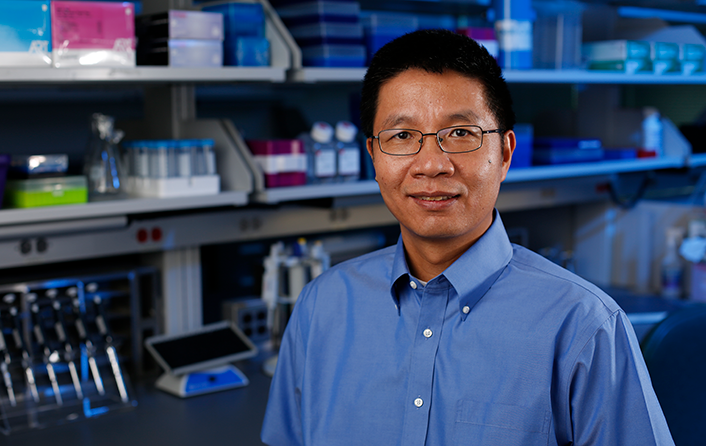
-
- Posted Tuesday October 26, 2021
New TGen study to combat pancreatic cancer: ‘Arming the Immune System to Recognize Foreign Invaders’
Seena Magowitz Foundation releases $200,000 toward a total grant of $1 million to fund the study
PHOENIX, Ariz. — Oct. 26, 2021 — The Translational Genomics Research Institute (TGen), an affiliate of City of Hope, has launched a new study intended to discover how to use the body’s immune system to treat patients with pancreatic cancer.
The study is being funded with a $1 million grant by the Seena Magowitz Foundation of which $200,000 has been initially released to kick-off the study.
“Pancreatic cancer is notoriously known to be resistant to treatments, including resistance to immune therapies,” said Haiyong Han, Ph.D., a Professor in TGen’s Molecular Medicine Division.
Deep within the body, pancreatic cancer tumor cells create their own microenvironment that shields the cancer from being attacked and killed by the patient’s immune system, Dr. Han explained, “We are investigating new therapeutic approaches that can modulate the pancreatic tumor microenvironment and render the tumor vulnerable, or responsive, to treatment by immunotherapies.”
Proteins found on the surface of tumor cells bind to proteins on the surface of cancer-killing immune cells, including T cells. This binding creates an “immune checkpoint,” preventing the T cells from attacking the patient’s cancer.
Treatments involving antibodies that block the immune checkpoints, known as “checkpoint inhibitors,” have worked on other tumors, most notably in lung and melanoma cancers. But they have so far proven unsuccessful in pancreatic cancer.
Dr. Han’s study will look at using immune checkpoint inhibitors, such as antibodies against PD-L1, PD-1, and CTLA-4. These antibodies can undo the immune checkpoint, thereby allowing the T cells to kill the tumor cells.
“Checkpoint inhibitors have shown dramatic activity in defeating some types of cancer. One of the main reasons for the inactivity of checkpoint inhibitors in pancreatic cancer is due to this malignancy’s unique tumor microenvironment, which is void of cancer-killing immune cells known as infiltrating lymphocytes, including T cells,” explained Dr. Han. “We are testing agents that target gene regulatory elements, known as super-enhancers, to disrupt the pancreatic tumor microenvironment, making the cancer vulnerable again to the immune system.”
Dr. Daniel Von Hoff, M.D., TGen Distinguished Professor who is designing the clinical trials that will be based on this work, puts the study into perspective: “Based on preliminary laboratory work done by Dr. Han and his team, we are very excited that this approach will further ‘arm’ a patient’s immune system (their T cells) so they do their job – killing the cancer cells.”
Roger Magowitz, who founded the Seena Magowitz Foundation in memory of his mother who died of pancreatic cancer, said he is excited about this new phase of TGen research in immunotherapy.
“Pancreatic cancer is one of the most difficult-to-treat of all cancers, and we are pleased to contribute to the potential scientific breakthroughs being pursued by TGen,” Magowitz said.
Funds for the study were generated by an extremely successful annual golf tournament organized over the past two decades by the Magowitz Foundation. However, because of the COVID pandemic, the tournament had to be indefinitely postponed in 2020 and 2021.
Later this month and in November (Pancreatic Cancer Awareness Month), and continuing into December 2021, the Seena Magowitz Foundation will hold several virtual fundraisers. Details of the virtual events can be found at https://seenamagowitzfoundation.org/events, or its Facebook Page, https://www.facebook.com/Seena.Magowitz.Foundation. For more information, contact Miranda Wainberg at [email protected] or call 936-635-0753.
# # #
About TGen, an affiliate of City of Hope
Translational Genomics Research Institute (TGen) is a Phoenix, Arizona-based nonprofit organization dedicated to conducting groundbreaking research with life-changing results. TGen is affiliated with City of Hope, a world-renowned independent research and treatment center for cancer, diabetes and other life-threatening diseases: CityofHope.org. This precision medicine affiliation enables both institutes to complement each other in research and patient care, with City of Hope providing a significant clinical setting to advance scientific discoveries made by TGen. TGen is focused on helping patients with neurological disorders, cancer, diabetes and infectious diseases through cutting-edge translational research (the process of rapidly moving research toward patient benefit). TGen physicians and scientists work to unravel the genetic components of both common and complex rare diseases in adults and children. Working with collaborators in the scientific and medical communities worldwide, TGen makes a substantial contribution to help our patients through efficiency and effectiveness of the translational process. For more information, visit: tgen.org. Follow TGen on Facebook, LinkedIn and Twitter @TGen.
Media Contact:
Steve Yozwiak
TGen Senior Science Writer
602-343-8704
[email protected]


